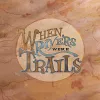Take a look inside 9 images
When Rivers Were Trails
Pros: Short but effective critique. Sheds light on erased Indigenous history.
Cons: Plods along a bit. Doesn't give players many strategic choices.
Bottom Line: Offers a valuable alternative perspective to the colonial history found in U.S. classrooms, through a familiar, Oregon Trail-style format.
U.S. history teachers could use When Rivers Were Trails to cover settler colonial events and Indigenous perspectives that don't often get attention in traditional textbooks or prebaked curricula. There's also a lot of value here for language arts teachers who are interested in having students explore choice-based fiction and/or Native American history, tradition, and storytelling. Since this game tells a poignant story of loss and adaptation, it's a perfect opportunity to explore game narratives. All of the dialogue is rich with meaning, not just historical detail but also cultural and spiritual traditions and ways of understanding the world. Some of this could be lost on students, especially those used to faster and louder games or students with attention difficulties. For this reason, it would be handy for a teacher to use a screen recording tool to capture gameplay and then bring it to the class for discussion after everyone has played through the game. A full playthrough takes an hour or two and could be assigned as homework or featured as a classroom or after-school activity for a couple of sessions. The game is free and available for Mac and PC as well as for iOS and Android; however, it's a 2 GB download.
The different encyclopedic entries (called "stories" in the game) are a good addition, with some interesting historical detail, but teachers will find them lacking. Still, they make good prompts for further study. For example, the entry on medicinal plants is fascinating and could send students down a research path about Indigenous approaches to healing. Some of this further research could start on the game's official wiki, but there's limited info there as well. It'd be best to curate a set of sources for students, like the National Museum of the American Indian.
When Rivers Were Trails plays similarly to The Oregon Trail, except it's a story of 1800s settler colonialism told from an Indigenous perspective. Through this perspective, players explore the consequences of broken treaties and the U.S. government's forcible relocation of Native peoples to make room for White settlers. Like The Oregon Trail, When Rivers Were Trails is a choose-your-own-adventure, presenting players with events and asking them to make choices on how they respond. Historical events and information get layered into this experience and tracked in a log that can be revisited. Players can sometimes choose to hunt or fish for food or play a canoeing mini-game. Players' journeys get displayed on a view of middle America that showcases Indigenous place names before colonization. Those familiar with the Western genre of movies and stories may recognize many famous landmarks in America's heartland (such as Deadwood), but these locations are visited from the point of view of a protagonist who is forced to flee their home and make a long journey west in search for a new home, possibly never finding it.
When Rivers Were Trails does a good job of conveying overwhelming loss and longing, hard emotions to even find in games let alone tackle well. The events are suitably weighty and poignant and surface rich historical detail and necessary anti-colonial perspectives. However, it can get a little monotonous, and players won't likely want to revisit it. This is mainly due to the lack of moral or strategic decisions that players make; instead, players mostly just click through to get to the next event. Those events are interesting, and there's subtlety and refinement to the storytelling, including sparing but evocative words and striking illustrations. Unfortunately, the further info players can dig into about key events is also a bit spare. These bits and pieces could still make for good research prompts. However, making the best use of this, as well as the rest of the game, leaves a lot up to teachers.

















